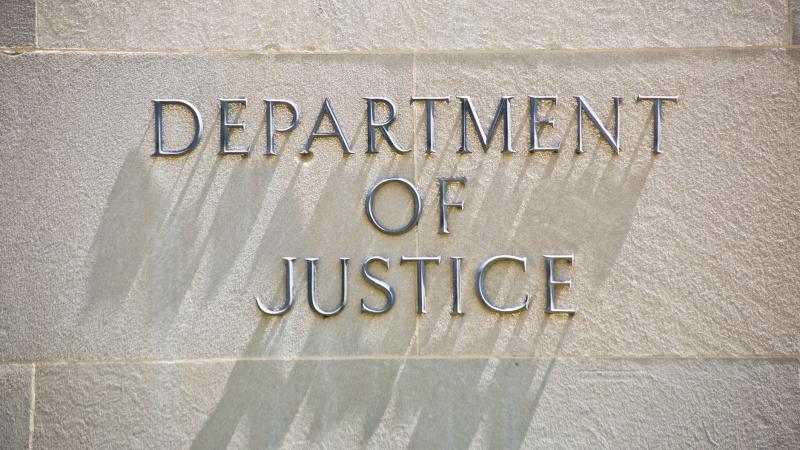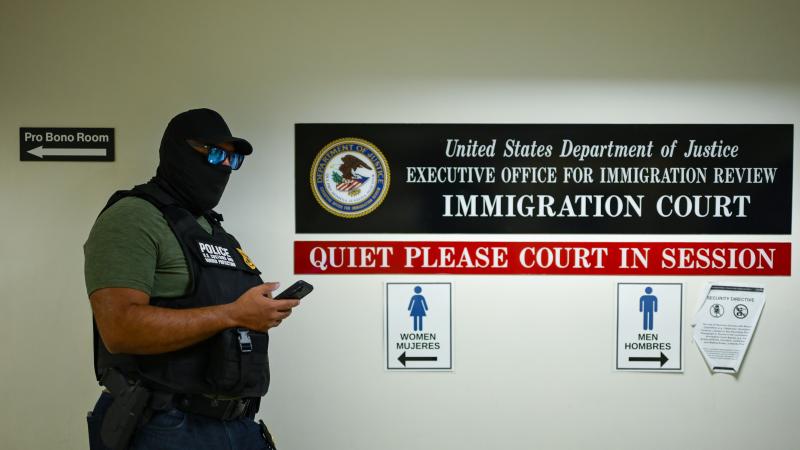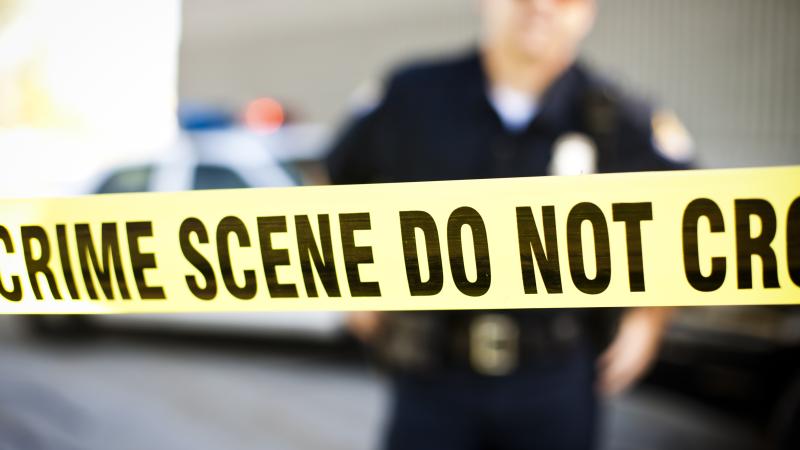Comey indicted for false statements related to leaks to the media
The FBI Director who led the bureau during the politicized Crossfire Hurricane investigation has been indicted by the Trump DOJ.
Fired FBI Director James Comey was indicted Thursday by a grand jury in the Eastern District of Virginia over allegations from the Justice Department that he made false statements to Congress when he denied leaking to the media and for the alleged obstruction of justice, sources familiar with the matter confirmed with Just the News.
"No one is above the law," Attorney General Pam Bondi said on social media. "Today’s indictment reflects this Department of Justice’s commitment to holding those who abuse positions of power accountable for misleading the American people. We will follow the facts in this case."
The first count of the indictment accuses Comey of making "false statements within the jurisdiction of the legislative branch of the United States Government." The indictment alleges that Comey "did willfully and knowingly make a materially false, fictitious, and fraudulent statement in a matter within the jurisdiction of the legislative branch of the Government of the United Stales, by falsely stating to a U.S. Senator during a Senate Judiciaiy Committee hearing that he, JAMES B. COMEY JR., had not 'authorized someone else at the FBI to be an anonymous source in news reports' regarding an FBI investigation concerning PERSON 1." The identity of "Person 1" was not specified.
The second count of the indictment alleges that Comey engaged in "obstruction of a Congressional proceeding" because he "did corruptly endeavor to influence, obstruct, and impede the due and proper exercise of the power of inquiry under which an investigation was being had before the Senate Judiciary Committee by making false and misleading statements before that committee."
The indictment against the former FBI chief comes two weeks after former Comey adviser and Columbia University law professor Daniel Richman was subpoenaed as part of a criminal probe. President Donald Trump has argued that Comey broke the law by sharing memos with classified information with the New York Times.
The indictments were brought by interim U.S. Attorney for the Eastern District of Virginia Lindsey Halligan. The former personal Donald Trump lawyer and White House aide was sworn in Monday. She replaced Erik S. Siebert, who resigned last week, allegedly under pressure from the Trump administration to bring charges against Comey.
"Well, I can't tell you what's going to happen because I don't know," Trump said from the White House when asked about the Comey saga and before indictments were announced. He also said Halligan, Bondi, and Deputy Attorney General Todd Blanche "are going to be making that determination."
Trump also said: "I can only say that Comey is a bad person. He's a sick person. I think he's a sick guy, actually. He did terrible things at the FBI. But I don't know. I have no idea what's going to happen."
The indictment for false statements and for obstruction was likely able to be obtained in a jurisdiction outside the nation’s capital because, even though Comey’s testimony was made during a Senate hearing held on Capitol Hill, the former FBI chief appeared remotely, likely from his home across the Potomac River in Virginia.
The DOJ’s indictment likely stems from allegations that Comey misled the Senate during his testimony in late September 2020, when he denied that he had ever authorized a leak of information to the media about the Trump-Russia investigation or Clinton-related investigations. The five-year statute of limitations on the charge would have likely lapsed this upcoming Tuesday.
“Today, your FBI took another step in its promise of full accountability. For far too long, previous corrupt leadership and their enablers weaponized federal law enforcement, damaging once proud institutions and severely eroding public trust. Every day, we continue the fight to earn that trust back, and under my leadership, this FBI will confront the problem head-on,” current FBI Director Kash Patel said on X on Thursday evening. “Nowhere was this politicization of law enforcement more blatant than during the Russiagate hoax, a disgraceful chapter in history we continue to investigate and expose. Everyone, especially those in positions of power, will be held to account — no matter their perch. No one is above the law.”
Comey, who oversaw the politicized investigation into Hillary Clinton's illicit use of a private email server to send classified information and the baseless Trump-Russia collusion inquiry, did not respond to a request for comment from Just the News sent to him through his book website.
But he posted a face-to-camera video on Instagram on Thursday night.
“My family and I have known for years that there are costs to standing up to Donald Trump, but we couldn’t imagine ourselves living any other way,” Comey said. “We will not live on our knees, and you shouldn’t either. Somebody that I love dearly recently said that ‘fear is the tool of a tyrant’ — and she’s right. But I’m not afraid, and I hope you’re not either.”
Comey concluded: “My heart is broken for the Department of Justice, but I have great confidence in the federal judicial system. And I’m innocent. So let’s have a trial. And keep the faith.”
Just the News revealed last month that Richman had previously admitted to federal agents in interviews that he routinely communicated on behalf of Comey, his longtime friend and a now-former special government employee at the bureau thanks to Comey, with Times reporter Michael Schmidt, whose work was among the newspaper's 2018 Pulitzer-winning stories on Russian election interference.
The goal, Richman told the FBI, was "to correct stories critical of Comey, the FBI, and to shape future press coverage" outside of the bureau's official press office, according to internal FBI memos that Patel delivered to Congress last month.
While Richman was known to have been publicly quoted in news stories as an advocate for Comey, he admitted to agents — who were part of the FBI’s Arctic Haze classified leaks inquiry — that he was given access by Comey to what turned out to be highly classified information and sometimes provided information to reporters on an anonymous basis.
Richman insisted to investigators that he did not believe he had confirmed or provided classified intelligence to reporters but said he could not be 100 percent, the memos state, noting he could only make his leak denial “with a discount.”
Senate Judiciary Committee Chairman Chuck Grassley, R-Iowa, had asked Comey in a May 2017 hearing whether he had “ever been an anonymous source in news reports about matters relating to the Trump investigation or the Clinton investigation.”
Comey replied, “Never.”
Grassley then asked whether Comey had “ever authorized someone else at the FBI to be an anonymous source in news reports about the Trump investigation or the Clinton investigation.”
Comey again testified, “No.”
When asked whether any classified information “relating to President Trump or his associates” had ever been declassified and shared with journalists, Comey said, “Not to my knowledge.”
While that testimony by Comey likely falls outside the statute of limitations for a false statements charge, the former FBI director directly doubled down on it in another Senate Judiciary Committee appearance on September 30, 2020.
During that hearing, Sen. Ted Cruz, R-Texas, brought up October 2016 leaks by since-fired FBI deputy director Andrew McCabe and pressed Comey on whether he himself had ever authorized leaks to the media as the bureau chief.
Comey replied, “I can only speak to my testimony. I stand by the testimony you summarized that I gave in May of 2017.”
“So your testimony is you've never authorized anyone to leak? And Mr. McCabe, if he says contrary, is not telling the truth, is that correct?” Cruz asked.
Comey replied, “Again, I'm not going to characterize Andy's testimony, but mine is the same today.”
Just the News also revealed last month that federal prosecutors gathered evidence from more of Comey's top lieutenants that he authorized the leak of classified information to reporters just before the 2016 election but declined to bring criminal charges.
The revelations involving ex-FBI general counsel James Baker and ex-Comey chief of staff James Rybicki were memorialized in documents that Patel discovered earlier this year. The memos detail evidence and interviews gathered by U.S. Postal Inspection Service agents concerning classified information leaked to the Times in October 2016.
"The USPIS [U.S. Postal Inspection Service] Investigation also revealed Baker disclosed USG [U.S. government] classified information to the NYT under the belief he was ultimately instructed and authorized to do so by then FBI Director James Comey," one summary memo reads. "For example, during interviews, Baker indicated FBI Chief of Staff James Rybicki instructed him (Baker) to disclose the information to the NYT, and Baker understood Rybicki was conveying this instruction and authorization from Comey."
The memos don't identify the specific pieces of classified information that were leaked or whether Comey or anyone else was authorized to declassify them for the media. But they were investigated by multiple prosecutors, including the U.S. attorney's office in the nation's capital under Trump's first administration and by future-special prosecutor John Durham, and all declined to bring criminal charges at the time.
Then-DOJ Inspector General Michael Horowitz wrote a report released in August 2019 criticizing Comey’s decision to leak his so-called “Comey Memos” — including details about Trump’s alleged comments about Lt. Gen. Mike Flynn — to the media in 2017 in an effort by the then-fired FBI director to spur the appointment of a special counsel.
Horowitz wrote that his investigation “interviewed 17 witnesses, including former Director Comey and Daniel Richman, the individual who, at Comey's request, shared the contents of one of the Memos with a reporter [Schmidt] for the New York Times.” Comey told Horowitz that the day after being fired by Trump, he retained Richman as an attorney.
“We have previously faulted Comey for acting unilaterally and inconsistent with Department policy,” the DOJ watchdog wrote. “Comey’s unauthorized disclosure of sensitive law enforcement information about the Flynn investigation merits similar criticism.”
Comey admitted in 2017 that he had hoped leaking this information “might prompt the appointment of a special counsel.” Horowitz concluded Comey’s leaks were “an attempt to force the Department to take official investigative actions.”
“Comey had several other lawful options available to him to advocate for the appointment of a special counsel, which he told us was his goal in making the disclosure,” Horowitz wrote. “What was not permitted was the unauthorized disclosure of sensitive investigative information, obtained during the course of FBI employment, in order to achieve a personally desired outcome.”
Horowitz sent a criminal referral to the DOJ over Comey’s memos at the time, but the DOJ declined to prosecute.
Comey’s leak efforts were successful, however, as Robert Mueller was appointed special counsel within days of the Comey Memo leaks making their way to the New York Times.













